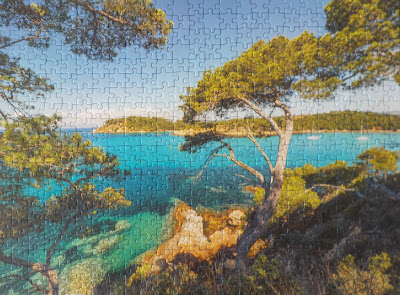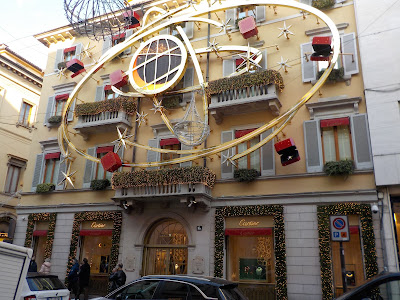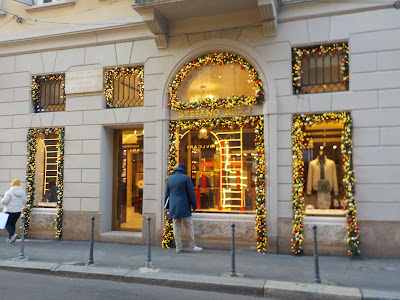What's 'in' this season: a light-hearted report from your roving fashion reporter ...
Hello, darlings, I've just parked up the Ferrari and have gone for a stroll in the Quadrilateral, Milan's fashion district. It's always a pleasant sight in the run up to Christmas, with special window displays, Christmas decorations and streets lit prettily.
Via Monte Napoleone, the heart of the Quadrilateral, has just become the most expensive piece of real estate in the world. One square metre of retail space will set you back around €50,000, sometimes more, so even a small boutique needs an outlay of many millions. Ironic for a street that's named after Napoleon's ministry to manage government debt!
 |
Via Monte Napoleone
|
It's more of a showcase rather than a place that actually does retail business. There are few price labels in the windows - frankly, if you have to ask the price, you really shouldn't be shopping here! And the fact that in many outlets the deliberate emptiness of floor and shelf space should tell you that here money should be no object.
(There is a top tip from me right at the end of my post if you want fashionwear at reasonable prices in Milan or in most other fashion capitals.)
I'm not sure why the No Entry sign here is looking sinister but maybe the eyes were painted by someone who was squinting for non-existent price labels ... or one who found one and disapproved of what was written on it.
So let's have a look at some of the Christmas windows, some pretty, some over-the-top garish.
Here's Marchesi, a 200 year old sweet shop, always very elegant.
I think pink bonbons compliment the cerise font of this blog, don't you?
Mmm... In contrast, Cartier is trying to make a statement. I'm not quite sure what.
Hermès has gone for champagne-quaffing, jazz-playing horses. But of course.
I used to translate Acqua di Parma advertising briefs into English and their shop is always shipshape and not unpleasant, with greenery and fairy lights. Given that they sell cologne, it smells nice too. That classic shade is known as Parma yellow after its adoption for official purposes by the former sovereign Dukes of Parma.
These guys have gone for a more Santa's Grotto look.Rosantica handbags has chosen a Russian nutcracker mannequin. A hand-made bag would suit any soldier, I'm sure.This is a nice shop that sells nothing but gloves in all colours.Loewe has gone for a marine look this year.
Marina Fossati jewellery is a bit chunky!
Plain but effective display from Bulgari.
Now, I always reserve a special spot for Valentino as their style and displays are somewhat unique. They first suggested to me that all-out pink was going to be the style of 2023 (which it kind of was but not as much as expected). Here's their store in the heart of the fashion district.
And some of the windows showing a decidedly '70s retro look, a sort of harem meets Abba style.
But it's this window below that had me agog! The gold minidress with sheer Abba-esque sleeves, turban and orange ribbed tights. So if you want legs like carrots, this could be the look for you...
What is more disturbing is that the next day, at the main station, this window display outside McDonald's had nothing but carrots in vases, each reflected in a large mirror to double the carrotiness. I have no idea what's going on with the carrot fixation around Christmas 2024, but I find it disturbing!
Can you have too much Vitamin A? And if so, what happens? Presumably your legs turn orange, with or without the Valentino tights.
Back to the streets, now. This vintage tram is not spared retail excess, being decked out with Atmosphera interiors, including curtains!
And many large retailers also go for all-over advertising. Here's one of the many trams currently in Sephora livery.To think that these classic streetcars still in everyday service are actually older than most in the tram museum I saw in Britain in September!
Enough of the brash clash with the classic for a moment, here we are in Via della Spiga, which is quiet as it's pedestrianised. A spiga is an ear of corn and the golden corn ears over the street are a nice touch, I think. I love the pretty little trees with simple golden fairy lights.
They're either native bay trees or fir trees, but every shop has one or two outside.There's less in the way of dining here, but the entrance to this restaurant is in a very beautiful quiet courtyard and the warm Christmas decorations are inviting.
Let me take you from the Quadrilateral now to the grand Victorian arcades, the Gallerie Vittorio Emanuele II. Sue's News & Views has been here before, of course, but every year is different.
A selection from the main four stores' windows, starting with Yves Saint Laurent:Prada:Giorgio Armani:Swarovski:There are, of course, other outlets here: boutiques, stores, cafés and restaurants. Marchesi again; their cake shop this time rather than the sweet shop we saw above:Boutique with lovely bags:Savini restaurant has been here since the arcade was built in 1867 and is a local institution:Well, that's my necessarily select tour of the stores in the world's fashion capital this Christmas. I saw a lot else in Milan, like the Christmas market round the cathedral, ate out at various nice places, and also had an early Christmas dinner, but I'll save that for another time. I also hunted for and found a local inspiration for my American readers who may be fearful about liberty and democracy from 2025. Oh! My Ferrari seems to have been towed away by the police whilst I've been chatting to you. Such a bore! I'll just have to buy another. After all, money's no object, right?
Sue x
NB Sue's top tip: if you do want recent fashionwear, but at reasonable prices, then visit the fashion houses' warehouses where the last items in the latest lines and previous seasons' items may be found at much less cost, with some bargains.







.jpg)









































